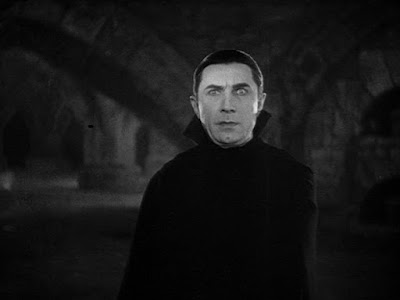February 22, 1931 [Dracula]
 First Murnau, now Tod Browning: The old Thing is most certainly undead, slipping away from his little box once more. Browning has lost Chaney—and what a Dracula he would have been, muscular and rising like a bloodthirsty pugilist as the bell tolls. But he gains Bela Lugosi—already stalking the vampire on the stage, now cornering him in Hollywood. And despite Browning’s best efforts—especially Dracula's home, dusty light resting on the pulsing necks of everything full-blooded, webs clinging like desire—and the Brides' advance on Harker, noiseless, inexorable—such moments are almost solemn, hushed in the presence of some dire royalty. But it’s Lugosi who commands the frame, stiff with post-mortem rigor, as proud as Satan of his looks, smiling to himself at the measured note of false sympathy in his curling voice. Lugosi has Dracula’s egoism, eager to be at the center of every dark room, his Theda Bara eyes narrowing just enough to catch you as you try to escape. He is having a wonderful time, amused by your growing certainty of just how bad things will get.
First Murnau, now Tod Browning: The old Thing is most certainly undead, slipping away from his little box once more. Browning has lost Chaney—and what a Dracula he would have been, muscular and rising like a bloodthirsty pugilist as the bell tolls. But he gains Bela Lugosi—already stalking the vampire on the stage, now cornering him in Hollywood. And despite Browning’s best efforts—especially Dracula's home, dusty light resting on the pulsing necks of everything full-blooded, webs clinging like desire—and the Brides' advance on Harker, noiseless, inexorable—such moments are almost solemn, hushed in the presence of some dire royalty. But it’s Lugosi who commands the frame, stiff with post-mortem rigor, as proud as Satan of his looks, smiling to himself at the measured note of false sympathy in his curling voice. Lugosi has Dracula’s egoism, eager to be at the center of every dark room, his Theda Bara eyes narrowing just enough to catch you as you try to escape. He is having a wonderful time, amused by your growing certainty of just how bad things will get.I am hard-pressed to think of another American movie so dedicated to the Gothic threat: The past disappears, and with it our possibilities, leaving only the Secret Unfolded, spreading like a poisonous bloom. And has any other actor been so pleased as Lugosi with making good on this threat?


Comments
Post a Comment